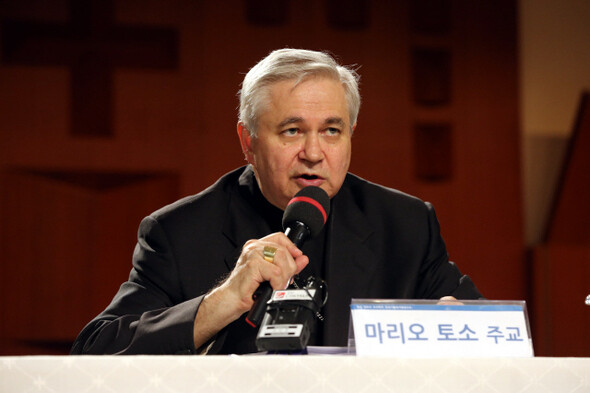hankyoreh
Links to other country sites 다른 나라 사이트 링크
Vatican Bishop defends Pope’s itinerary on visit to Seoul

By Cho Yeon-hyun, religion correspondent
“The Pope cannot visit everyone who extends an invitation. That’s why he needs a lot of helpers. When the bishops, the priests, the monks, and the faithful are there by the side of the poor and weak, they are helping the Pope. After all, Jesus Christ does favor the weak.”
This was the response of Bishop Mario Toso, Secretary of the Pontifical Council for Justice and Peace at the Vatican, to claims of “disappointment” with Pope Francis’s upcoming August trip to South Korea, which critics have called out of step with his previous emphasis on the poor and suffering. Toso, 64, was speaking at a press conference on June 23 at the Catholic Bishops’ Conference of Korea headquarters in Seoul’s Junggok neighborhood.
Toso explained that he came to explain the meaning of “Evangelii Gaudium (The Joy of the Gospel),” Pope Francis’s 2013 exhortation, in advance of the August visit.
“Pope Francis’s visit is intended to make South Korea’s churches rise and shine on the world,” Toso said.
“The task of the church is to spread the gospel and share its joy. The Pope is coming to Korea to strengthen that faith,” he continued. “The more love grows, the more we can dedicate ourselves to justice; the more we love Jesus Christ, the more things we can devote ourselves to and the more we can do service for the public good in our country.”
Toso also responded to charges that South Korean Catholic churches are increasingly for the wealthy.
“I think there’s a difference between the perception and the reality,” Toso said. “You can see it in the places where the church is working. South Korea’s priests and nuns are there risking their lives with the people who had their property rights taken away with the Miryang electricity transmission towers, there with the disadvantaged people whose rights have not been protected.”
Toso went on to address the South Korean church’s position in response to priests speaking out on allegations of National Intelligence Service interference in the 2012 presidential election and the Four Major Rivers Project.
“The word ‘salvation’ also refers to salvation in social terms, and the church has teachings for the social, economic, political, and legal aspects of human lives,” he said.
“The church and state exist in a relationship where each guarantees autonomy to the other, but the church cannot prevent people from saying what is right or wrong in ethical and religious terms,” he continued.
Before the press conference, Toso met for a discussion with around 20 people, including Bishop Mathias Lee Yong-hoon, chairman of the CBCK Justice and Peace Committee, and various diocese chairs and standing committee members.
“Korea’s priests and monks are working with the disadvantaged, but it does not seem to be that they are educating and training members of the flock and activists so that more people share with the poor and weak,” Toso said during the discussion.
“It has also been the case that priests and monks have tried to do the right thing and been persecuted,” he added. “It may take some time for the magisterium (Vatican) to recognize their actions, so they should not merely complain about the lack of recognition.”
“After all, when something is right, it will ultimately be recognized,” he continued.
That afternoon, Toso delivered a keynote speech at a symposium on the Pope’s visit at Myeong-dong Cathedral in Seoul. He plans to visit the Gwangju and Daegu dioceses before delivering a public address at Myeong-dong Cathedral at 1:30 pm on June 26. He will also be attending a discussion with priests and monks at 5 pm that afternoon before departing South Korea on June 27.
Please direct questions or comments to [english@hani.co.kr]

Editorial・opinion
![[Column] Park Geun-hye déjà vu in Yoon Suk-yeol [Column] Park Geun-hye déjà vu in Yoon Suk-yeol](https://flexible.img.hani.co.kr/flexible/normal/500/300/imgdb/original/2024/0424/651713945113788.jpg) [Column] Park Geun-hye déjà vu in Yoon Suk-yeol
[Column] Park Geun-hye déjà vu in Yoon Suk-yeol![[Editorial] New weight of N. Korea’s nuclear threats makes dialogue all the more urgent [Editorial] New weight of N. Korea’s nuclear threats makes dialogue all the more urgent](https://flexible.img.hani.co.kr/flexible/normal/500/300/imgdb/original/2024/0424/7317139454662664.jpg) [Editorial] New weight of N. Korea’s nuclear threats makes dialogue all the more urgent
[Editorial] New weight of N. Korea’s nuclear threats makes dialogue all the more urgent- [Guest essay] The real reason Korea’s new right wants to dub Rhee a founding father
- [Column] ‘Choson’: Is it time we start referring to N. Korea in its own terms?
- [Editorial] Japan’s rewriting of history with Korea has gone too far
- [Column] The president’s questionable capacity for dialogue
- [Column] Are chaebol firms just pizza pies for families to divvy up as they please?
- [Column] Has Korea, too, crossed the Rubicon on China?
- [Correspondent’s column] In Japan’s alliance with US, echoes of its past alliances with UK
- [Editorial] Does Yoon think the Korean public is wrong?
Most viewed articles
- 1[Column] Park Geun-hye déjà vu in Yoon Suk-yeol
- 2Will NewJeans end up collateral damage in internal feud at K-pop juggernaut Hybe?
- 3Thursday to mark start of resignations by senior doctors amid standoff with government
- 4Why Korea shouldn’t welcome Japan’s newly beefed up defense cooperation with US
- 5‘We must say no’: Seoul defense chief on Korean, USFK involvement in hypothetical Taiwan crisis
- 6[Guest essay] The real reason Korea’s new right wants to dub Rhee a founding father
- 7N. Korean hackers breached 10 defense contractors in South for months, police say
- 8[Column] ‘Choson’: Is it time we start referring to N. Korea in its own terms?
- 9[Editorial] New weight of N. Korea’s nuclear threats makes dialogue all the more urgent
- 10Kim Jong-un expressed ‘satisfaction’ with nuclear counterstrike drill directed at South